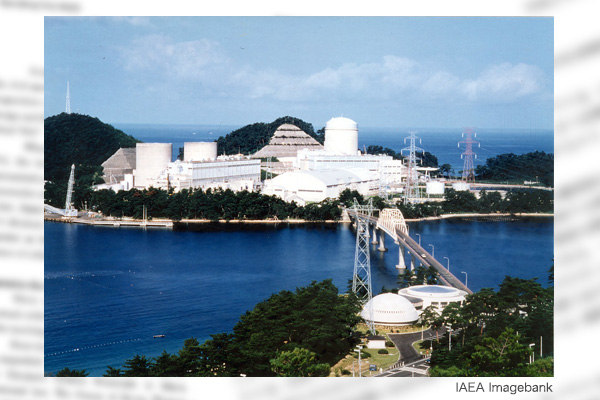The 44-year-old Unit 3 reactor of Kansai Electric Power Co.’s Mihama Nuclear Power Station (in Mihama, Fukui Prefecture) has recently restarted for the first time in 10 years. The Asahi Shimbun and Tokyo Shimbun newspapers described the reactor as decrepit, indicating that it could encounter an accident anytime soon.
However, the Act on Control of Nuclear Reactors, etc., as revised in 2013, authorizes the service life of a nuclear reactor aged over 40 years to be extended by up to 20 years once. All nuclear reactors undergo regular checks and are subjected to special inspections every 10 years and especially in their 30th years, meaning that their aging countermeasures are strictly assessed. Pressure vessels and pipes in reactors are thoroughly checked for corrosion or cracking. If any problem is found, they are replaced with new ones. These checks are designed to secure the quality of any reactor seen at the time of its initial operation. As reactors are renewed through checks, it is wrong to describe renewed reactors as decrepit.
Do not follow suit of Ukraine to phase out nuclear plants
The Asahi Shimbun and other Japanese mass media advocating a nuclear phaseout policy, as well as politicians and the people in general supporting such policy, should pay attention to the tragedy of Ukraine whose industry and economy have collapsed under a nuclear moratorium policy.
Ukraine became independent after experiencing the Chernobyl nuclear power plant accident in 1986 when it was part of the Soviet Union. In 1991, it decided on a moratorium on new nuclear reactor construction. Then, its electricity grid became unstable, causing frequent blackouts. Ukraine’s mainstay steelmaking and shipbuilding plants failed to work, leading to the collapse of heavy industries. Many people lost jobs, with starvations and suicides increasing.
Ukraine lifted the moratorium in 1992 and decided to receive economic aid from the Group of Seven industrial democracies. But the heavy industries failed to revive after their collapse, forcing Ukraine to become a farm country. The tragedy of Ukraine is the collapse of its industry and economy under the nuclear moratorium rather than the Chernobyl accident. As known well, an aircraft carrier, the construction of which was suspended, was sold as scrap to China (and was completed as China’s first carrier named Liaoning).
Electricity price spikes to destroy industry
When an accident occurred at the Fukushima Daiichi Nuclear Power Station of Tokyo Electric Power Company Holding Inc. in 2011, Japan had 50 nuclear reactors. So far, only 10 reactors have restarted, including Mihama Unit 3. In the past 10 years, the effective shutdown of nuclear power plants has had a great impact on the Japanese economy. Electricity price hikes have forced Japan to lose its share of the solar photovoltaics panel market to China. Japan’s three major heavy electric machinery manufacturers (Hitachi Ltd., Toshiba Corp. and Mitsubishi Heavy Industries Ltd.) that had led world’s nuclear power plant construction have lost competitiveness and stopped exports of nuclear and fossil-fired power plant as prices of steel materials produced at electrical furnaces have shot up. In electric vehicle sales, Japan has also lagged far behind China and Europe.
Stable, cheap electricity supports industry. If Japan depends on intermittent, costly renewable energy power generation, its industry will be defeated in international competition. To counter China now armed with dominant resources and manufacturing capacity and to achieve the Japanese government’s goal of cutting greenhouse gas emissions in fiscal 2030 by 46% from fiscal 2013, Japan should absolutely restart existing nuclear plants, extend their service life beyond 40 years, replace existing plants and build new and additional ones. To prevent industry from collapsing as seen in Ukraine, Japan should reconsider the policy of placing renewable energy above anything else.
Tadashi Narabayashi is a specially appointed professor at the Tokyo Institute of Technology and a director at the Japan Institute for National Fundamentals.


